© Gizmodo.com
PureVPN has been around since 2006, which is like a lifetime in the fast-paced VPN world. What started as a small service has grown into a heavyweight, boasting over 6,000 servers in more than 65 countries. But let’s not pretend it’s been a smooth ride. PureVPN had a rough patch when an incident with the FBI left its reputation bruised in the privacy community. Since then, it has been on a mission to regain trust, focusing on independent audits and tightening up its no-logs policy.
Now, don’t get us wrong—PureVPN has come a long way, but it’s not without its quirks. It packs a punch with robust features, solid security, and an impressive server network. But is that enough? Does it check all the boxes for what you need in a VPN?
In this in-depth review, our cybersecurity expert team examines PureVPN’s features, speeds, privacy standards, and device performance. We’ll provide a thorough analysis of both its strengths and areas for improvement. By the end of this review, you’ll have a clearer understanding of whether PureVPN is the right VPN for you.
PureVPN
Despite a highly controversial past, PureVPN has managed to significantly improve its offering over time. Has it become one of the best VPNs? Not quite. However, it remains a solid VPN that will be useful in many situations.
Pros
An extensive network in 65+ countries
Robust security with quantum-resistant servers
All servers are streaming ready
User-friendly interface for a wide range of devices
Affordable long-term plans
Cons
Inconsistent speeds on certain servers
UDP and TCP protocols have occasional connectivity issues
Price hike after subscription period
Limited advanced features
Rudimentary customer support
Pricing Overview for PureVPN
PureVPN offers pricing plans designed to fit both short-term needs and long-term savings. While the monthly plan might seem a bit steep at $12.95/month for ongoing coverage, there’s good news for those thinking ahead.
Their 1-year plan cuts the cost to just $3.99/month, offering solid value for a longer commitment.
And if you’re really looking to lock in savings, the 2-year plan brings it even lower at $2.14/month—perfect for anyone aiming for affordable long-term protection.
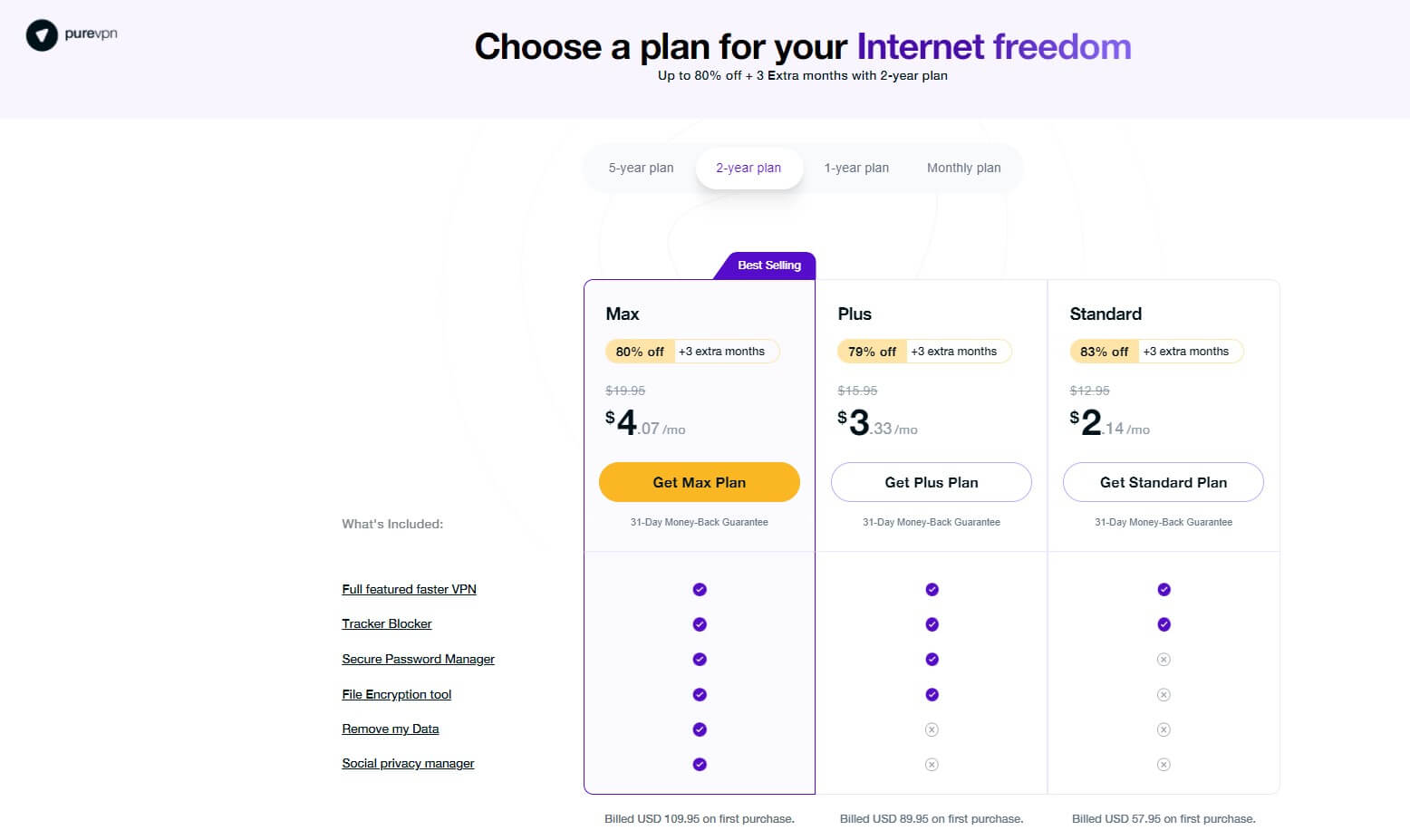

PureVPN’s plans come with various additional features, packaged across Standard, Plus, and Max tiers:
Standard covers basic VPN services.
Plus adds a password manager, enhancing your security for logins.
Max boosts privacy with features like end-to-end encryption and privacy management.
These VPN plans renew at higher rates once the initial term expires, so keep that in mind when budgeting for the long term. Still, the pricing remains competitive compared to the market leaders in the VPN industry, such as NordVPN and ExpressVPN.
Add-ons & Customization
To customize the VPN experience, PureVPN also offers:
Dedicated IP: Ideal for secure access and gaming, it’s available for $2.49/month. That said, we believe there are more reliable VPNs offering dedicated IP addresses.
Port Forwarding: Useful for running servers or secure data sharing, priced at $1.49/month.
PureDome for Businesses
For business customers, PureDome provides a robust suite tailored to enterprises. VPN licenses start at $8.45 per user/month, with volume discounts for additional users. Dedicated IPs cost $7 per address/month, and VPN gateways start at $50 per gateway, which helps manage bandwidth and secure connections across teams.
Payment & Guarantee
All subscriptions are backed by a 31-day money-back guarantee and support a variety of payment options, including:
Credit/Debit Cards
PayPal
Google Pay
Cryptocurrencies (Bitcoin, Litecoin, Ethereum)
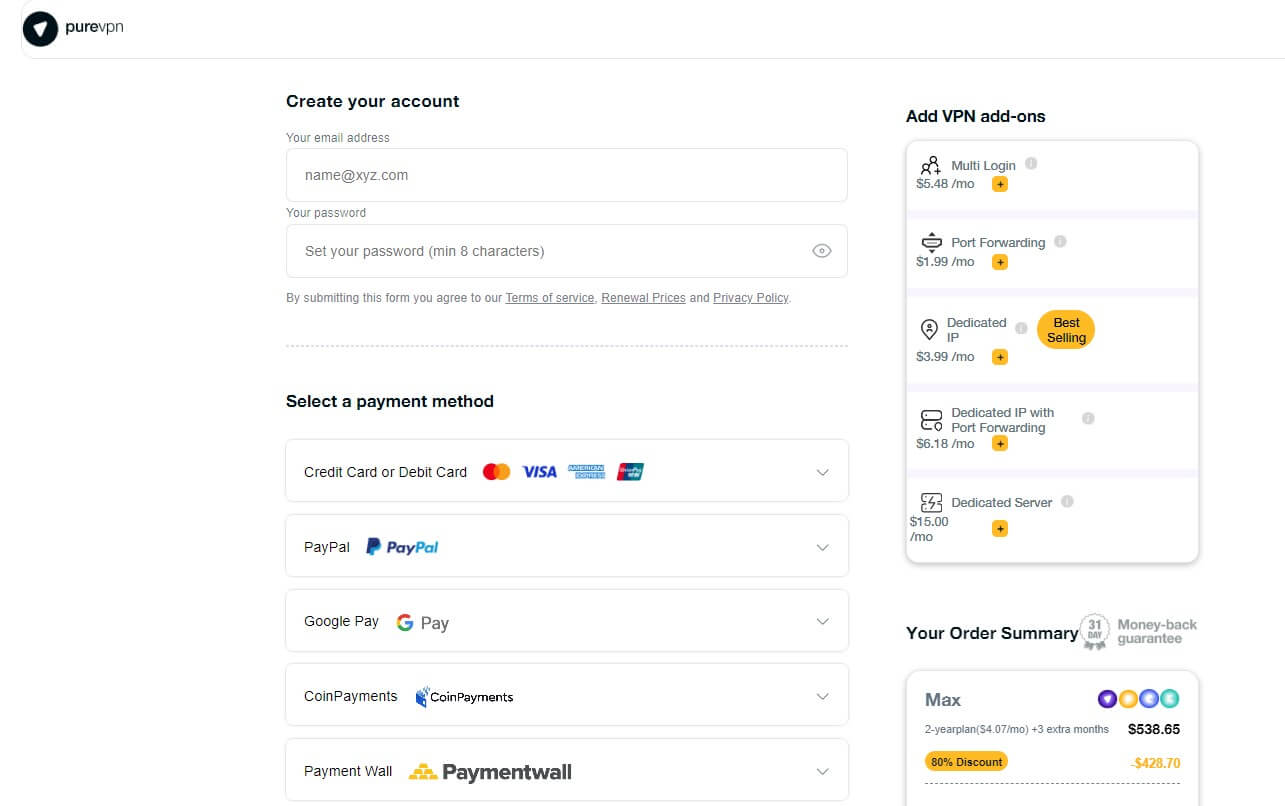

PureVPN often has special deals, like including their password manager, PureKeep, at no extra cost with some plans. It’s worthwhile to keep an eye out for these time-sensitive offers. Renewal costs do increase after the initial discounted period, so plan accordingly.
While PureVPN’s long-term prices are attractive and offer great value, it’s important to weigh these benefits against other needs, such as speed, customer support, and specific feature requirements, especially when considering the best alternatives to PureVPN, like NordVPN, ExpressVPN, or Private Internet Access, to name a few.
Security Features of PureVPN Analyzed
PureVPN takes a multi-layered approach to security, providing both basic and advanced features designed to keep your online activities private and secure. This in-depth analysis breaks down everything that PureVPN offers in terms of security.
Basic Security Features
AES-256 Encryption: PureVPN uses industry-standard AES-256 encryption, offering strong protection for all your data and traffic. This “military-grade” encryption ensures your online activities remain private and safe from hackers or government snooping.
Kill Switch: A must-have feature, the kill switch disconnects your internet if the VPN connection drops, preventing any accidental exposure of your real IP address.
Split Tunneling: PureVPN allows you to select which traffic passes through the VPN and which accesses the internet directly. This feature is especially helpful if you want to maintain high speeds on certain applications while encrypting other sensitive traffic. If you’re curious to learn more, we have a dedicated article explaining what split tunneling is and how it works.
DNS and IP Leak Protection: PureVPN provides built-in protection against DNS and IP leaks, ensuring that your real IP address and location are always hidden from any prying eyes.
Advanced Security Features
For those looking for more robust protection, PureVPN offers advanced tools that enhance security and performance.
Quantum-Resistant Encryption Keys
PureVPN has started implementing quantum-resistant encryption keys to future-proof your data security. With the growing capabilities of quantum computers, traditional encryption could potentially become less effective.
This advanced technology ensures that even as cybercriminals develop new techniques, your data remains secure. Currently available on 20+ servers, this feature’s reach is continuously expanding.
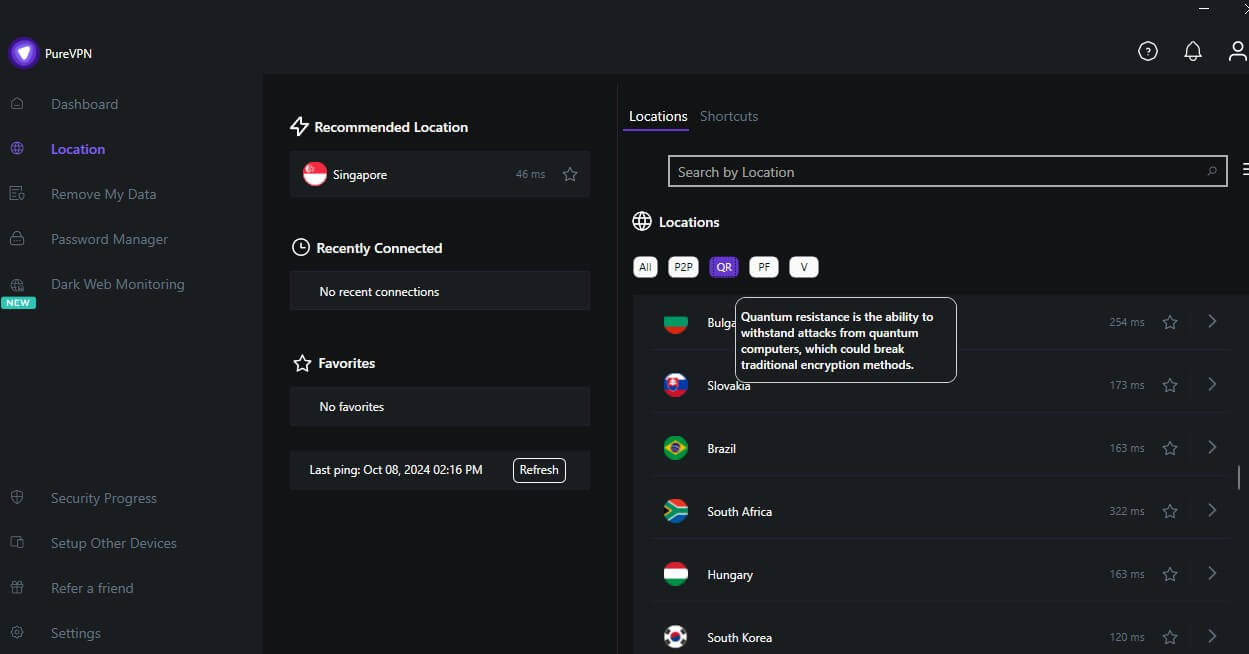

Secure Protocol Options
In our review, we found that PureVPN allows users to select from several security protocols, offering a balance of speed and security:
WireGuard: A highly efficient and secure protocol known for its speed and lightweight nature, suitable for streaming and online gaming.
OpenVPN (TCP/UDP): A well-known protocol offering strong encryption and reliability, with the option to choose between UDP for faster performance or TCP for added security.
IKEv2/IPSec: Ideal for mobile users, this protocol automatically re-establishes a connection when switching between Wi-Fi and mobile networks.
PPTP and L2TP: These legacy protocols are also available for those who may prioritize speed over security, though they are less recommended for safety.
If you’re not sure which protocol to use, check out our WireGuard vs. OpenVPN comparison.
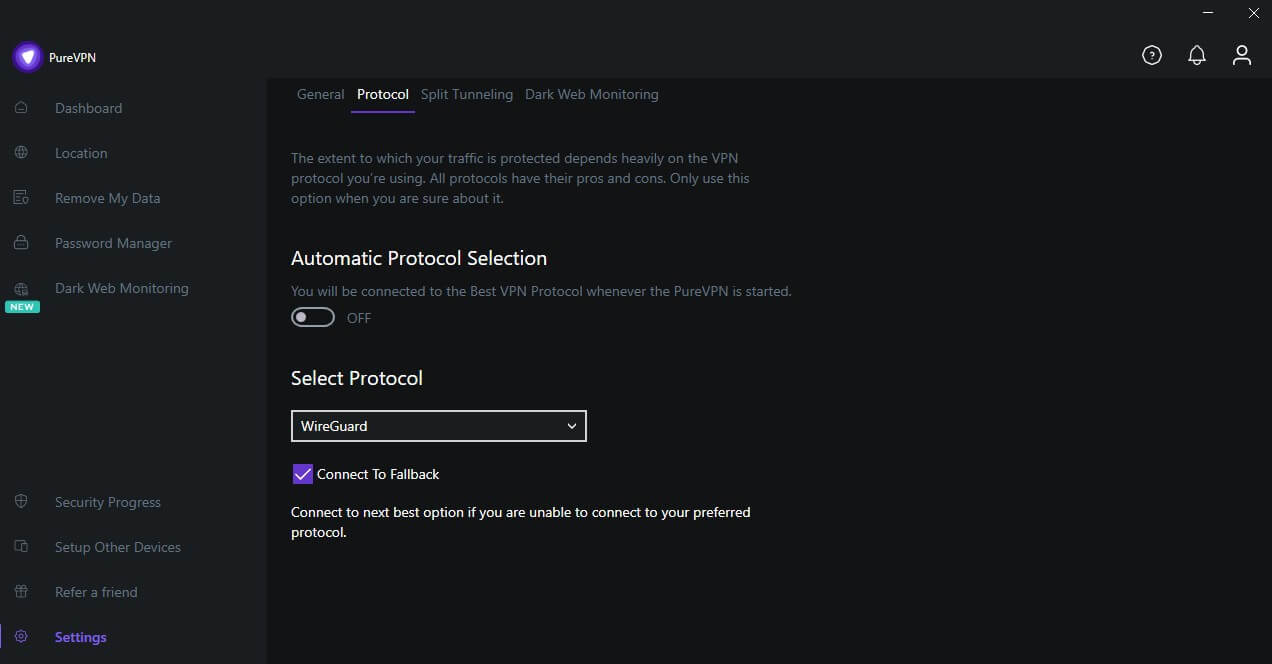

DDoS Protection & Port Forwarding
DDoS Protection: Available as an add-on, DDoS protection shields you from attacks that overwhelm your network, maintaining uninterrupted internet access, especially useful for gaming or business purposes.
Port Forwarding: This add-on allows you to securely open ports for specific online activities, such as gaming or accessing a home server, without compromising your overall network security.
Obfuscated Servers for Censorship Bypass
For those needing access in restrictive environments like China, PureVPN offers obfuscated servers that hide VPN usage, enabling you to bypass firewalls and censorship. This feature helps users remain undetected while accessing geo-restricted content or browsing in countries with internet censorship.
We performed an analysis on PureVPN obfuscated servers and noticed that they aren’t enabled by default. To access them, go to Settings and disable the Automatic Protocol Selection option. Now select TCP and UDP to enable OpenVPN and obfuscation.
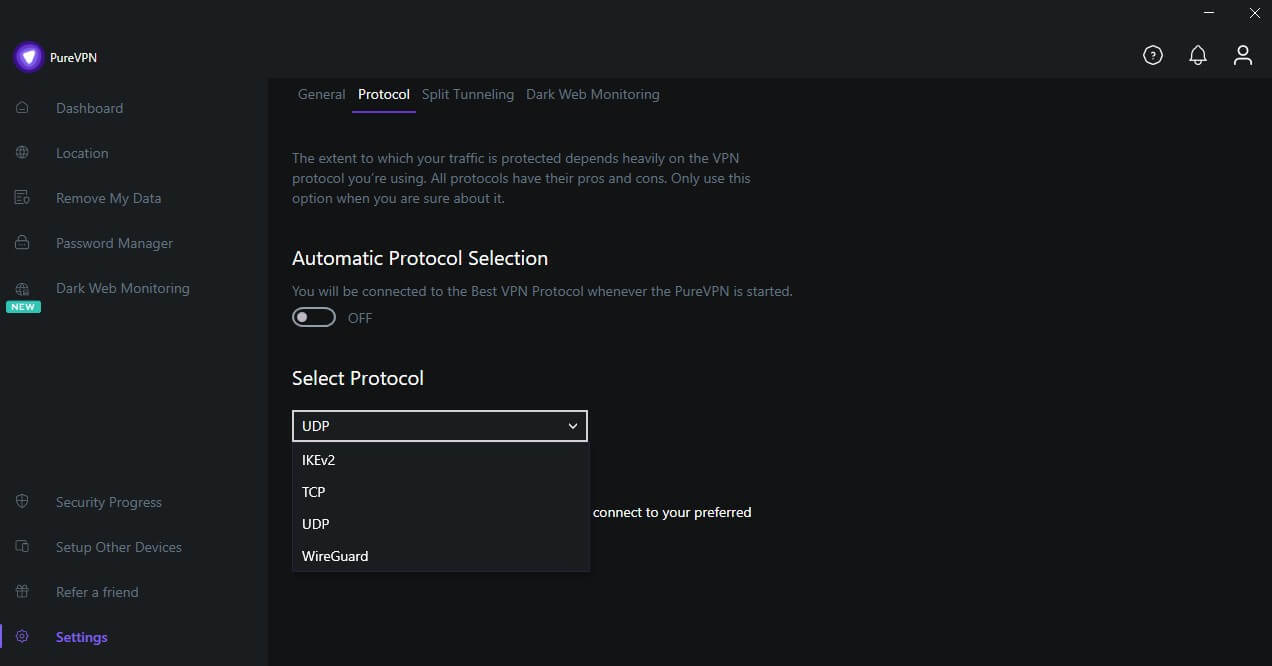

The above-advanced features make PureVPN a comprehensive security suite for those who prioritize online privacy, security, and access to global content. However, while it offers many strong elements, it does face competition in areas like speed and customer support, which will be covered in the coming sections.
PureVPN Leak Tests: Complete Privacy
When testing a VPN, leak protection is critical to ensure that your IP address and DNS requests aren’t inadvertently exposed. We thoroughly tested PureVPN across different devices and servers to evaluate its leak protection capabilities.
IP and DNS Leak Protection
PureVPN claims to provide solid IP and DNS leak protection. For an in-depth review of its security capabilities, we tried it by connecting to multiple servers in various locations, such as the US, UK, and Asia, using testing tools like ipleak.net and browserleaks.com. These tools help detect if any of your real IP address or DNS requests are visible outside the VPN tunnel.
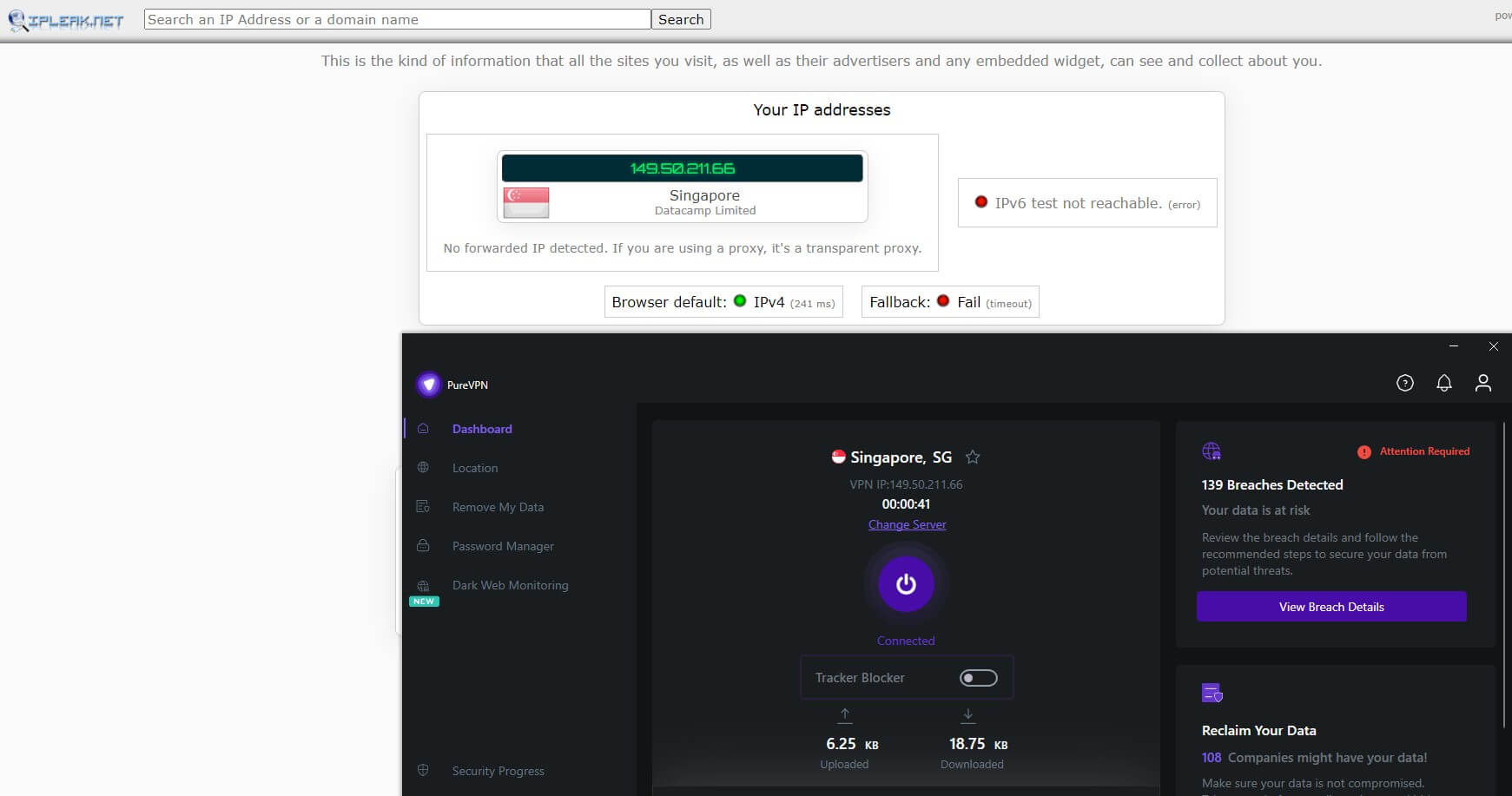

During our review, PureVPN consistently passed with no detected leaks. This means that the service effectively masked the real IP address and ensured DNS requests were routed through its encrypted servers.
IPv6 Leak Protection
IPv6 is the next generation of IP addressing, and many modern networks use this protocol. Without proper leak protection, a VPN might still expose your IPv6 address even when connected. PureVPN’s IPv6 leak protection guarantees that all IPv6 traffic is securely tunneled, preventing any accidental exposure. During our PureVPN review, it was adequately protected against IPv6 leaks as well, offering a full layer of privacy.
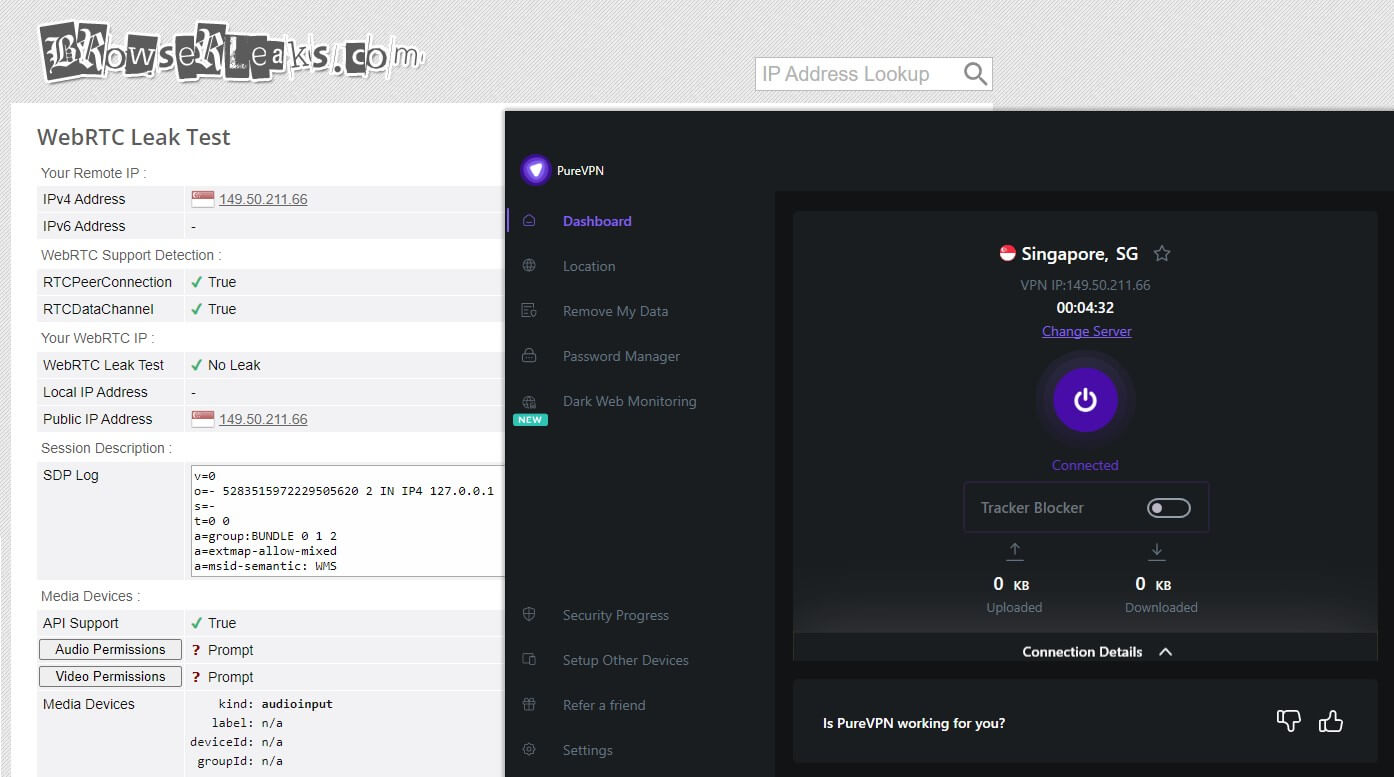

WebRTC Leak Protection
WebRTC (Web Real-Time Communication) is another area that can expose your real IP address if not managed correctly, especially when using web-based apps for communication. PureVPN includes WebRTC leak protection, and when we tested across browsers (like Chrome and Firefox), no WebRTC leaks were detected.
PureVPN offers strong leak protection across IP, DNS, and WebRTC with its consistent performance across multiple tests. However, if you want to prioritize anonymity over everything else, we always recommend periodically performing leak tests as an added precaution.
PureVPN’s advanced security features add value, but when compared, NordVPN’s ‘Double VPN’ and ExpressVPN’s ‘TrustedServer’ technologies enhance user security even further, offering multi-layered protection.
PureVPN Logging Policy: Privacy in Practice
Privacy is the cornerstone of any VPN, and a strict no-logs policy is essential. PureVPN has evolved in this area, overcoming past controversies. Since its 2018 policy revamp, PureVPN now claims not to log any identifiable user data, meaning no records of your IP address, browsing activity, or session timestamps are kept.
Third-Party Audits
To back these claims, PureVPN underwent third-party audits by Altius IT and KPMG, with both firms verifying the VPN’s compliance with its no-logs promise. The KPMG audits are “always-on,” meaning PureVPN can be audited at any time without prior notice.
What Data Is Collected?
While PureVPN anonymizes most of the data, it does collect minimal information like:
Bandwidth usage: To monitor server performance.
Connection timestamps (without specifics): Only the date, no detailed time.
This anonymized data helps improve their service but isn’t linked to any specific user activity.
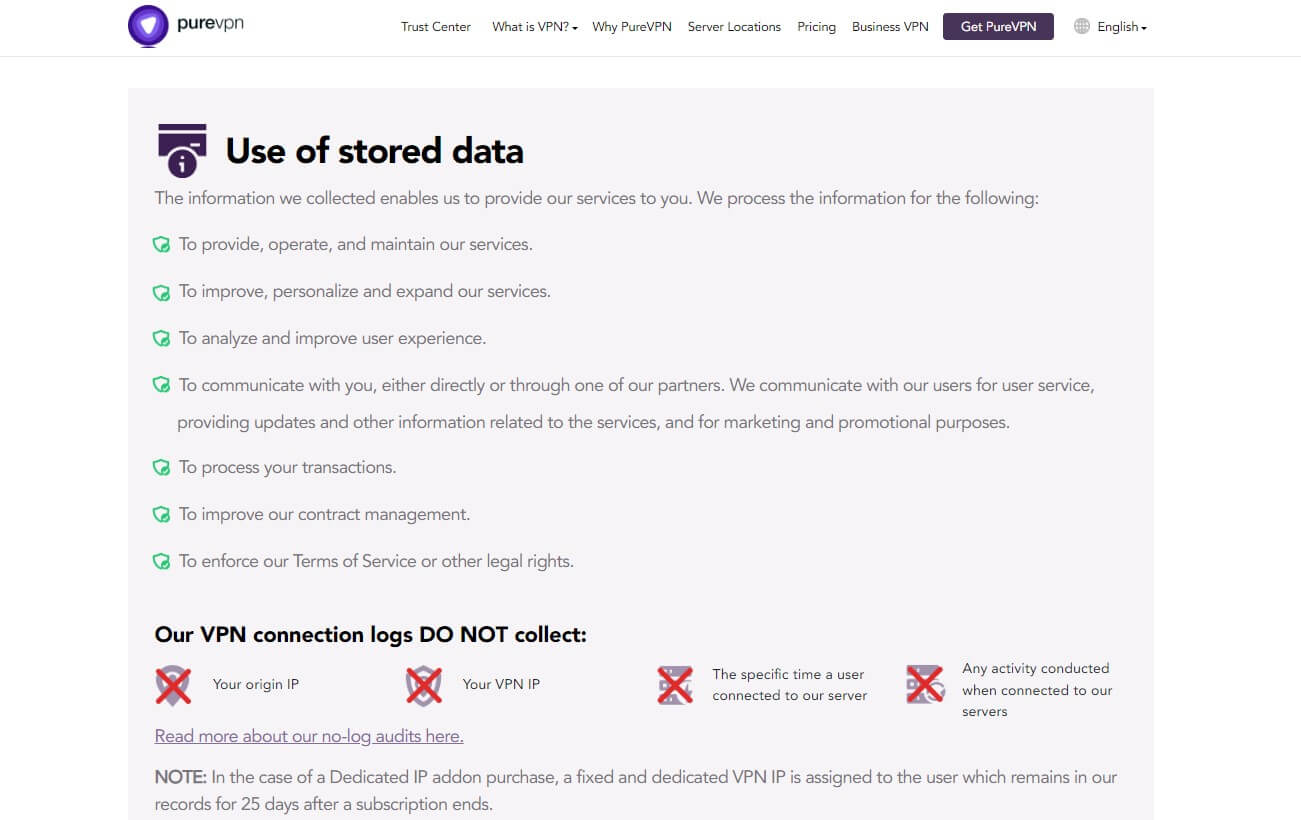

PureVPN’s Privacy Jurisdiction
PureVPN, relocated to the British Virgin Islands (BVI) from Hong Kong, is now outside the reach of 5/9/14 Eyes Alliance, a coalition of countries that share data surveillance practices. The BVI jurisdiction means less pressure to log data or comply with international data-sharing laws, adding another layer of privacy protection.
The Impact of Past Logging Controversies
PureVPN’s reputation took a hit in 2017 when it cooperated with the FBI to identify a user involved in a cyberstalking case. The backlash led to a complete overhaul of their logging policies, which today stand among the most transparent and privacy-centric in the industry.
With independent audits and a clear policy, PureVPN has taken steps to prove its commitment to user privacy.
Performance and Speed Test Results: No Records Broken
Speed is at the heart of any VPN review, and PureVPN’s performance does show some promise, albeit with a few quirks. We’ve tried its speeds and usability across various scenarios. Let’s break down how it fared on different fronts.
Speed Test Results
Speed is often the make-or-break factor when choosing a VPN, and PureVPN’s performance is worth diving into. We performed an in-depth review on speeds by connecting to different servers to see how well it maintains your browsing, streaming, and torrenting experiences. Here are our speeds before connecting to a server on PureVPN.
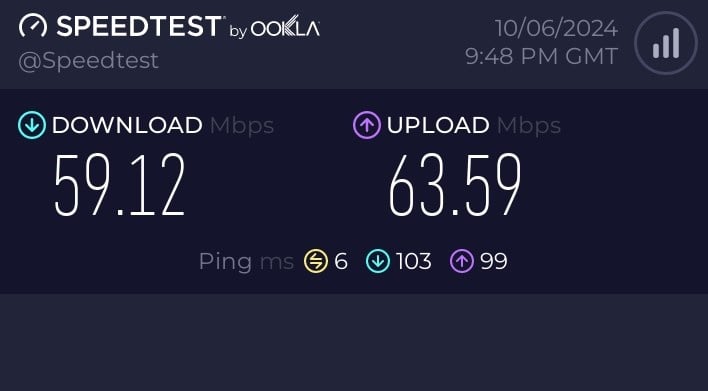

Regional Servers (USA and Canada)
When connected to servers close to our location in the USA, PureVPN excelled, with speeds dropping only 15-20%. Download speeds remained at an impressive 50-53 Mbps, ensuring smooth, buffer-free HD streaming and gaming. The ping was also commendably low, between 100 ms. This makes PureVPN a great choice for everyday use without noticeable slowdowns.
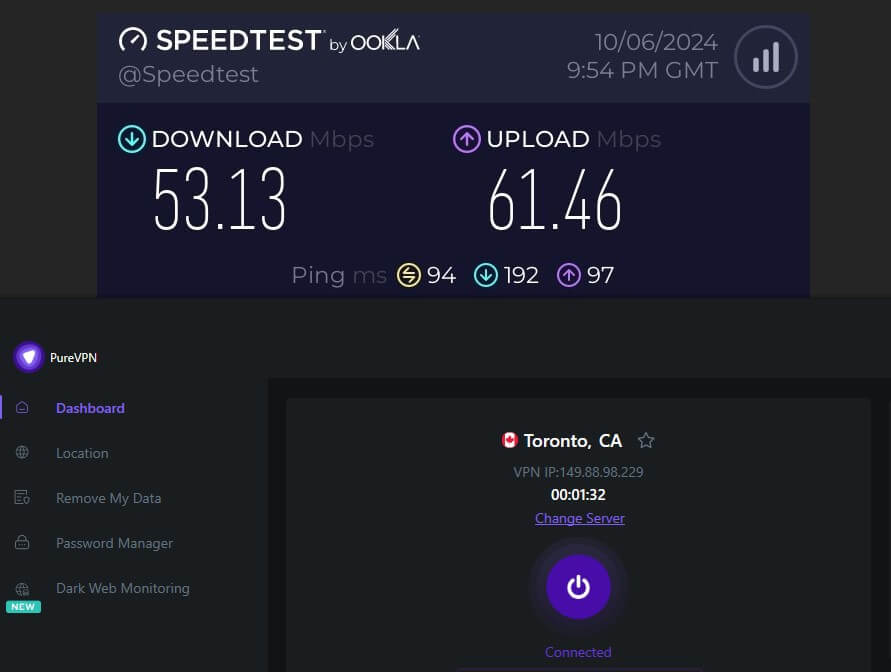

Mid-Range Servers (UK and Europe)
Moving further out, testing servers in the UK and Europe revealed more of a dip, with speeds around 40-45 Mbps and an upload rate maintaining 55-60 Mbps. Based on our review, The ping ranged between 100-200 ms—suitable for browsing, streaming, and gaming up to some extent. You’ll experience some slowdowns, but they won’t hinder regular activities.
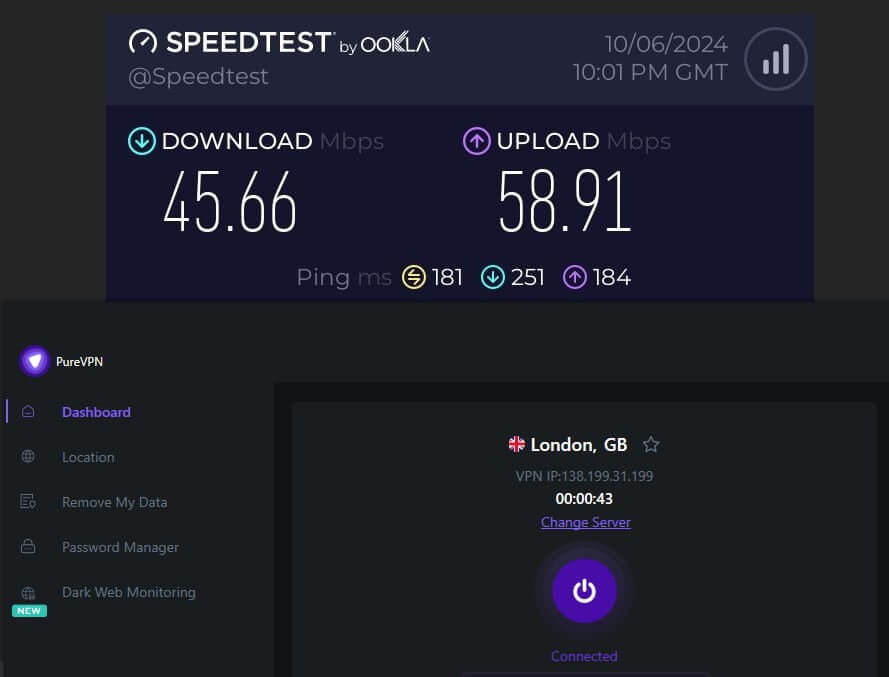

Long-Distance Servers (Asia & Australia)
Now for the marathon test—connecting to servers in Asia and Australia. Expect speeds to drop down to 35-40 Mbps with ping pushing over 250 ms. That means browsing and streaming are still feasible, but gaming and other real-time activities may face noticeable lag. It’s still manageable for downloading and general browsing, but you might want to use these servers sparingly.
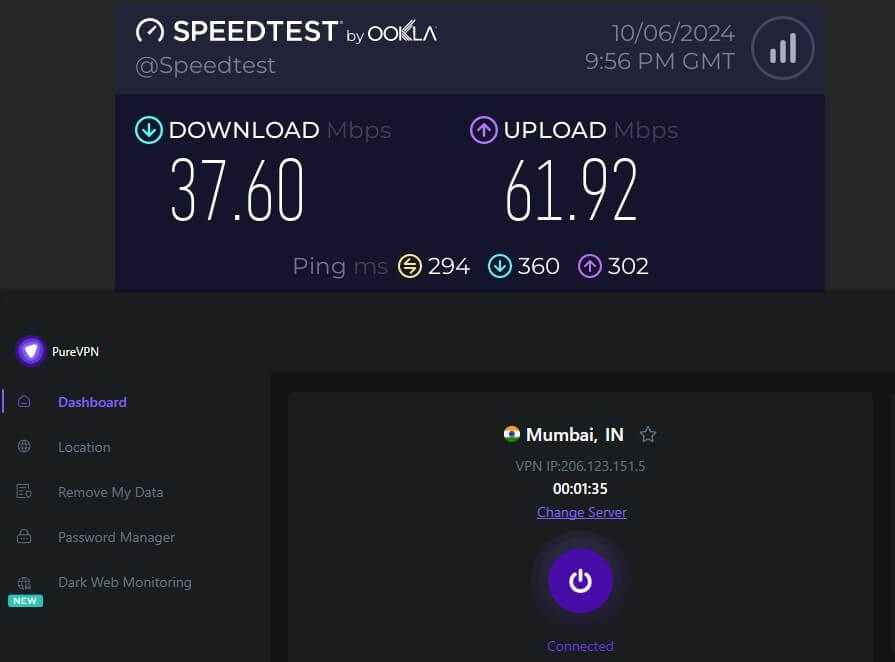

High-Performance Protocols
PureVPN shines when you switch over to the WireGuard protocol. It’s a game-changer, improving speeds by an extra 10-15% compared to traditional protocols like OpenVPN. We noticed better stability, especially when connected to those longer-distance servers. If you’re looking for a boost in performance, WireGuard is the way to go.
Though PureVPN manages decent speeds, especially on local servers, NordVPN’s optimized version of WireGuard protocol (NordLynx) consistently offers better speeds on long-distance connections across regions like Asia and Australia.
Are you curious to know more about NordLynx? Check out our in-depth review of NordVPN, where we analyze all its offerings and test its privacy and security capabilities. We also recently created a complete comparison of PureVPN and NordVPN if you need help making a choice.
Streaming and Torrenting: Above Average
A VPN’s ability to support streaming and torrenting makes a big difference for many users. PureVPN has evolved into a reliable option for these activities, rivaling some of the big names in the industry.
Unblocking Streaming Platforms
PureVPN has significantly improved its streaming performance, matching its performance against its top rivals.
To test PureVPN’s potential, we first decided to access country-restricted websites and streaming platforms without connecting to any server.


Realizing the restriction, we connected to a server where the website was available, and PureVPN managed to bypass the geo-restriction without issues. However, it isn’t all smooth sailing.
When we reviewed its performance with regional platforms in countries with strict restrictions, it struggled at times. Changing the protocol and trying different server locations sometimes helped. That said, you can count on PureVPN to watch Channel 4 in Australia (or Channel 5), for example.
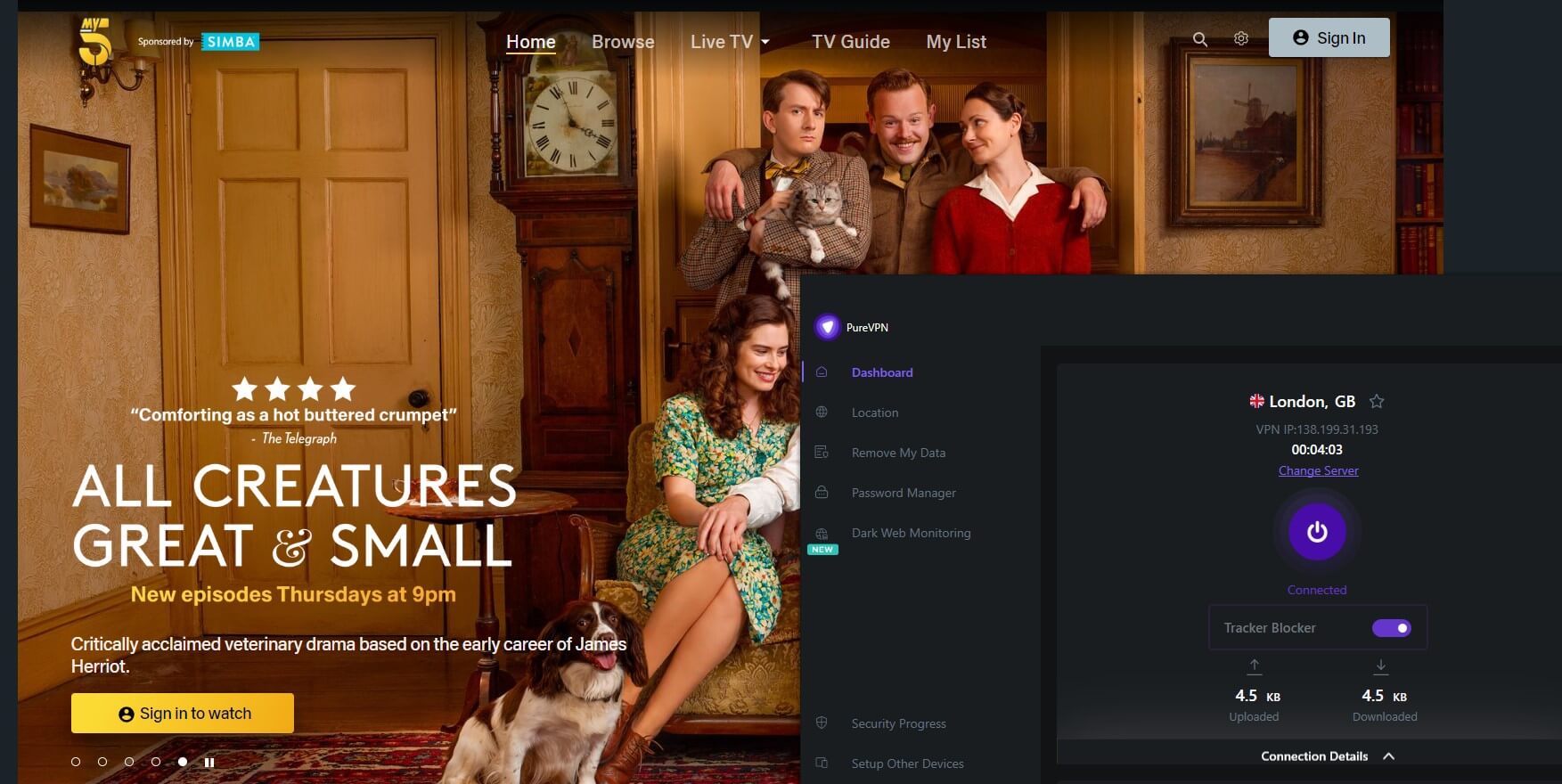

PureVPN’s performance on Netflix was quite impressive. It managed to break through restrictions on popular libraries in the US, UK, Canada, Japan, and Australia.
Streaming in these regions was a breeze, with smooth HD playback and barely any buffering—although, in some cases, it took a moment for full HD to kick in.
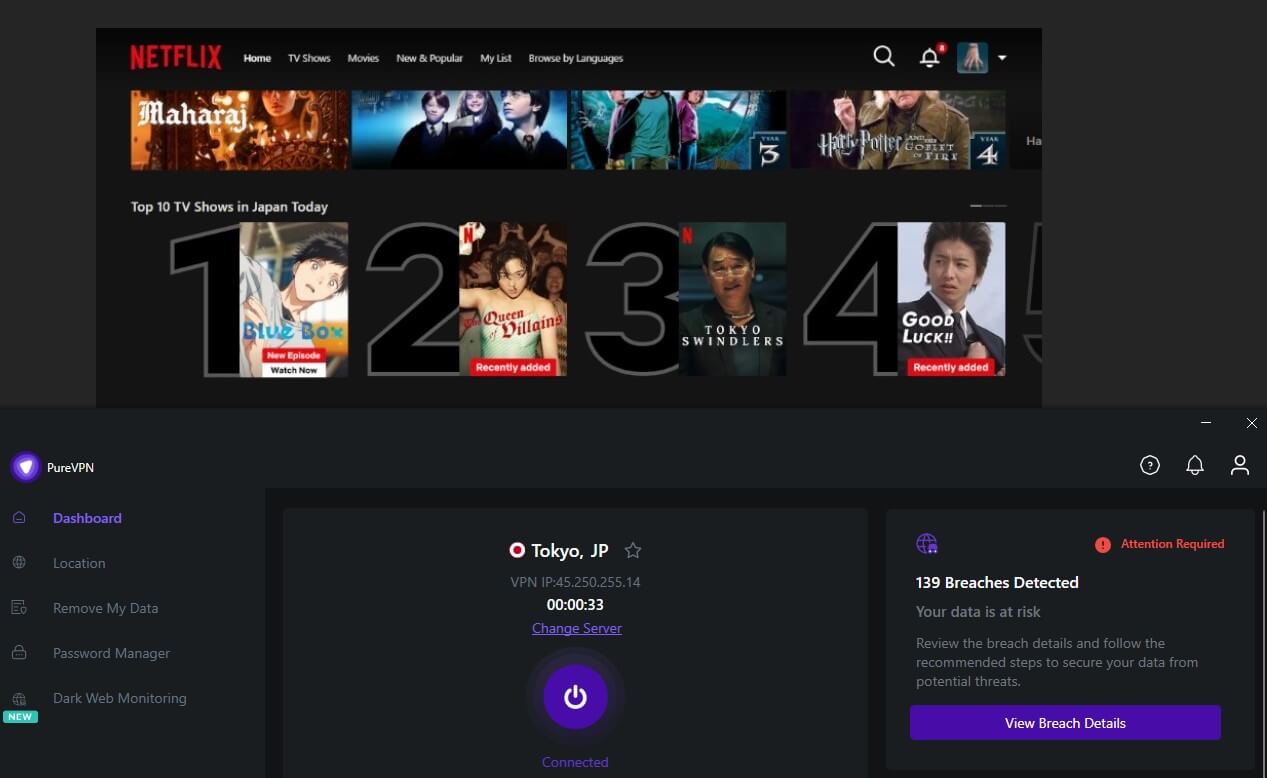

For those who need reliable access to every streaming library, NordVPN, ExpressVPN, and Private Internet Access are still top contenders and among the best VPNs for Netflix. That said, PureVPN also holds its ground well with its streaming-capable servers.
Torrenting Capabilities
When it comes to torrenting, PureVPN delivers a solid experience. Its split tunneling feature lets you choose which apps or sites bypass the VPN, giving you control over your connection. Add to that the NAT firewall, which adds a layer of security, and you’re set for safer browsing.
But what stands out is PureVPN’s P2P-optimized servers, and to put this to the test, we tried to download a few torrent files and it was able to deliver decent download speeds and a secure environment for torrenting.
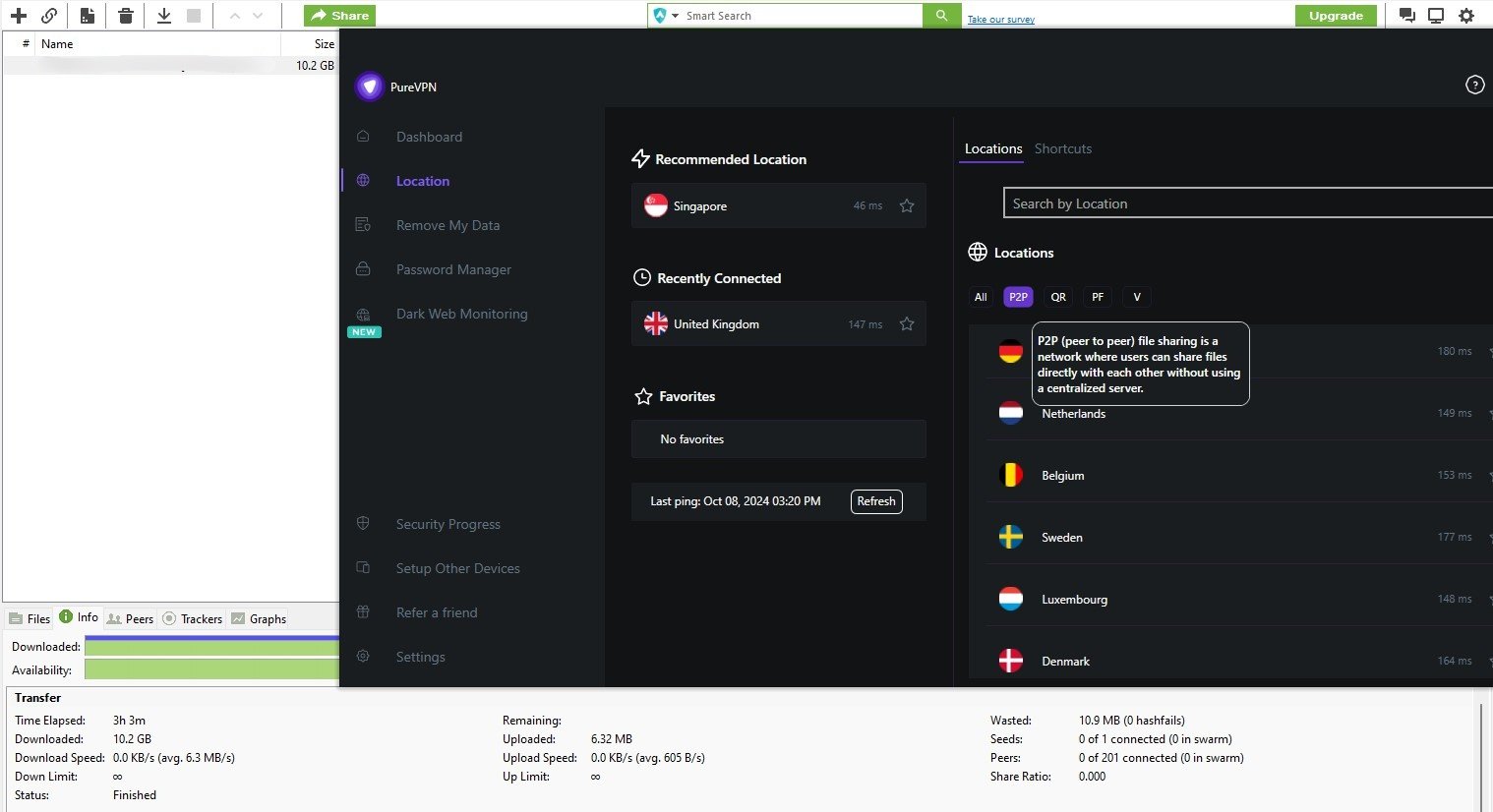

That said, there’s a small catch. Some key locations—like the US, UK, Canada, and Australia—don’t support P2P traffic directly. This means you might have to switch to alternative servers, which isn’t a dealbreaker but does add an extra step. Some competitors, like NordVPN, make it easier by offering P2P on all servers or automatically rerouting your connection to the right spot.
When we reviewed PureVPN, it managed to maintain a good balance between performance and accessibility. If your priority is streaming and occasional torrenting, it’s a strong contender.
But if you’re after uninterrupted access to all your favorite libraries and hassle-free P2P support on every server, NordVPN might be a better fit.
Server Network and Locations
PureVPN’s server network is one of its strong points, offering a wide range of options for users. With over 6,500 servers in more than 65 countries across 80+ locations, PureVPN provides excellent global coverage.
This extensive network helps maintain reliable connections, even during peak usage hours and offers multiple choices for bypassing geo-restrictions.
Coverage Across Continents
PureVPN effectively covers all major continents. Europe and North America have the highest concentration of servers, ensuring consistent speeds and quick connections in those regions. Additionally, it is one of the few VPNs that still has servers in Russia.
Asia, Africa, and Oceania are well represented, too, with major countries hosting multiple servers, providing stable and reliable access to local and global content.
Specialty Servers
Virtual Servers: PureVPN is transparent about its use of virtual servers, which can mimic a physical server location and still provide reliable connections. These servers are clearly marked, allowing users to choose between physical and virtual options based on their needs.
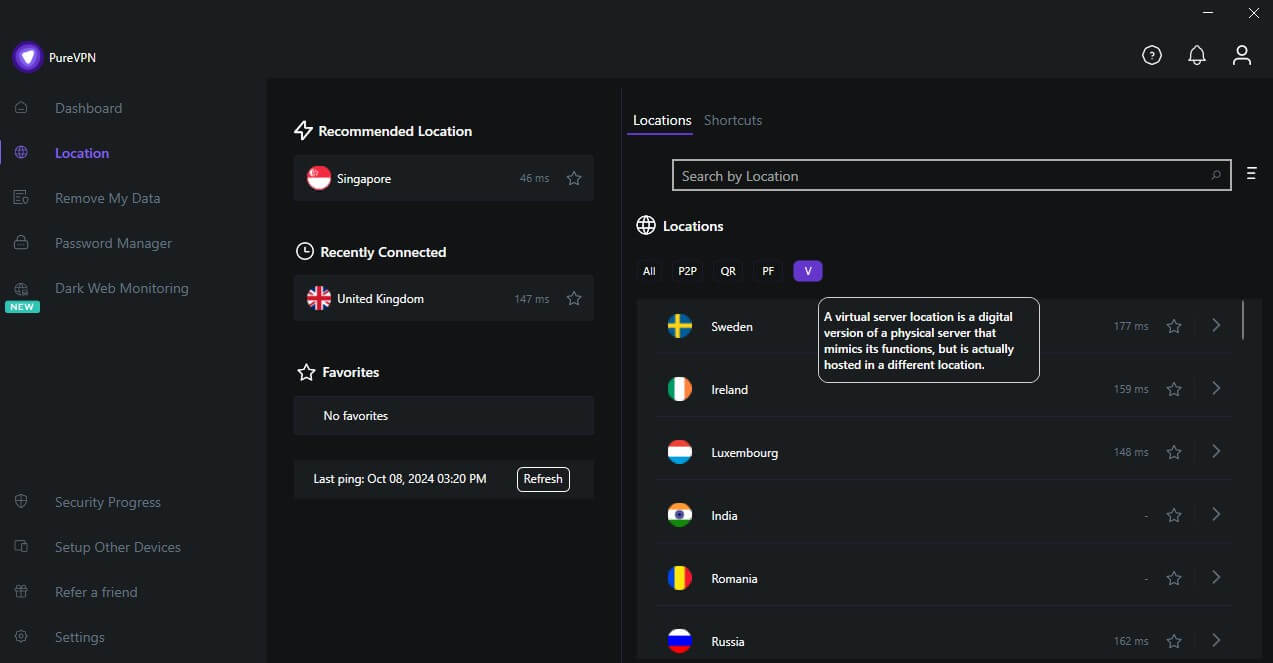

Dedicated IPs: As said earlier in our PureVPN review, it offers dedicated IPs for those who require a unique address for purposes like hosting a website, remote access, or allowing the listing of specific IP addresses.
With its diverse server locations and ample coverage, PureVPN offers a solid infrastructure to cater to various needs, whether for streaming, secure browsing, or torrenting.
Bypassing Censorship: How Reliable Is PureVPN?
PureVPN’s suite of tools for circumventing censorship includes some robust features aimed at getting past restrictive firewalls and internet blocks.
Obfuscation and Stealth Protocols
PureVPN uses obfuscation to hide VPN traffic, making it appear like regular HTTP or HTTPS traffic. This is particularly useful in heavily censored regions like China and Russia, where internet surveillance is tight.
These obfuscated servers are designed to operate stealthily, bypassing even deep packet inspection (DPI)—a sophisticated censorship tactic used by governments to block VPNs.
That said, PureVPN is far from being the best VPN to use in China. We had mixed results in the last few months, but for less restricted countries, it works just fine. For example, it’s a great VPN for Dubai.
Server Options and Protocol Flexibility
PureVPN’s OpenVPN and WireGuard protocols automatically adjust for stealth operations. This enables seamless access even in highly censored networks. Moreover, we found in our review that PureVPN’s range of servers, including ones strategically located near censored regions, allows you to connect reliably.
Effectiveness and Practical Use
PureVPN’s Domain Fronting feature, combined with its obfuscation capabilities, makes it a strong option for bypassing different types of censorship worldwide. However, depending on the location and type of restriction, the reliability can vary. The service constantly adapts to changing censorship technologies, making it a viable option for those looking to access free, open internet in restricted environments.
Ease of Use & Compatibility
PureVPN stands out for its broad compatibility, smooth installation, and straightforward apps. Its ease of use extends to most devices, including desktops, mobile devices, streaming devices, and even routers, making it versatile for different needs.
When we used PureVPN for the first time, we were asked to select the purpose of using it so that tailored suggestions could be offered. Based on our inputs the dashboard and options are updated accordingly.
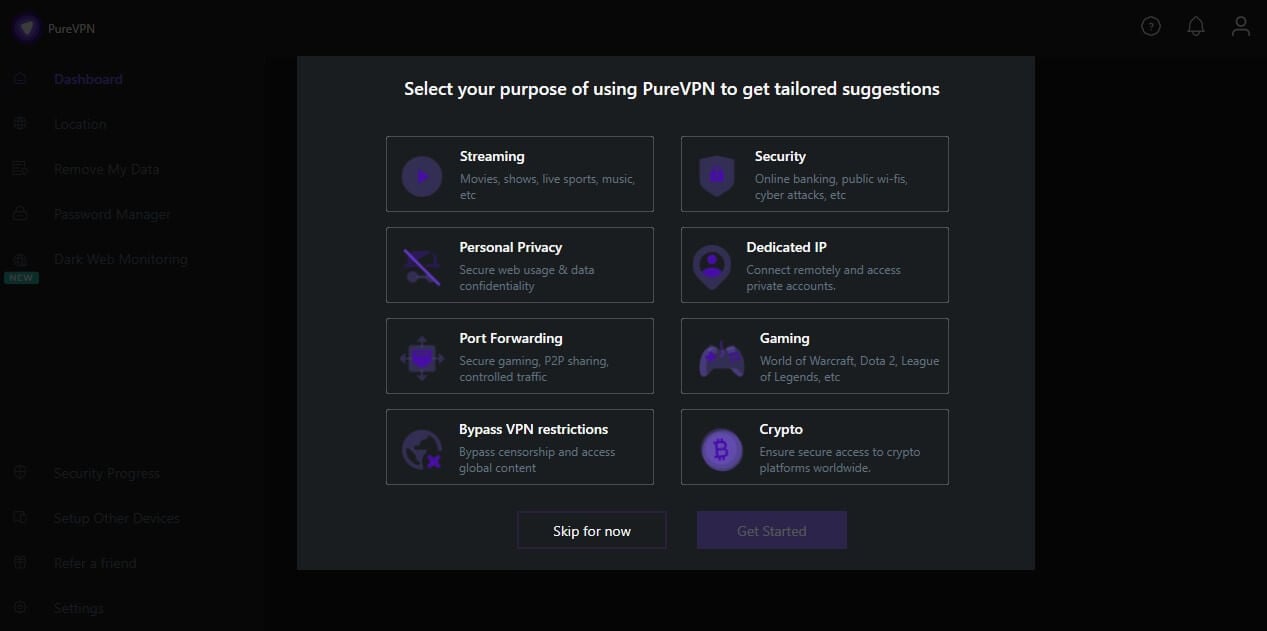

User Interface & App Design: Our Honest Opinion on PureVPN
The PureVPN app is simple, making it easy for both beginners and more experienced users to navigate its features.
While the design could use some polish, especially compared to the slicker visuals of other VPNs, the layout prioritizes function over style, ensuring you find key features like the kill switch or split tunneling without hassle.
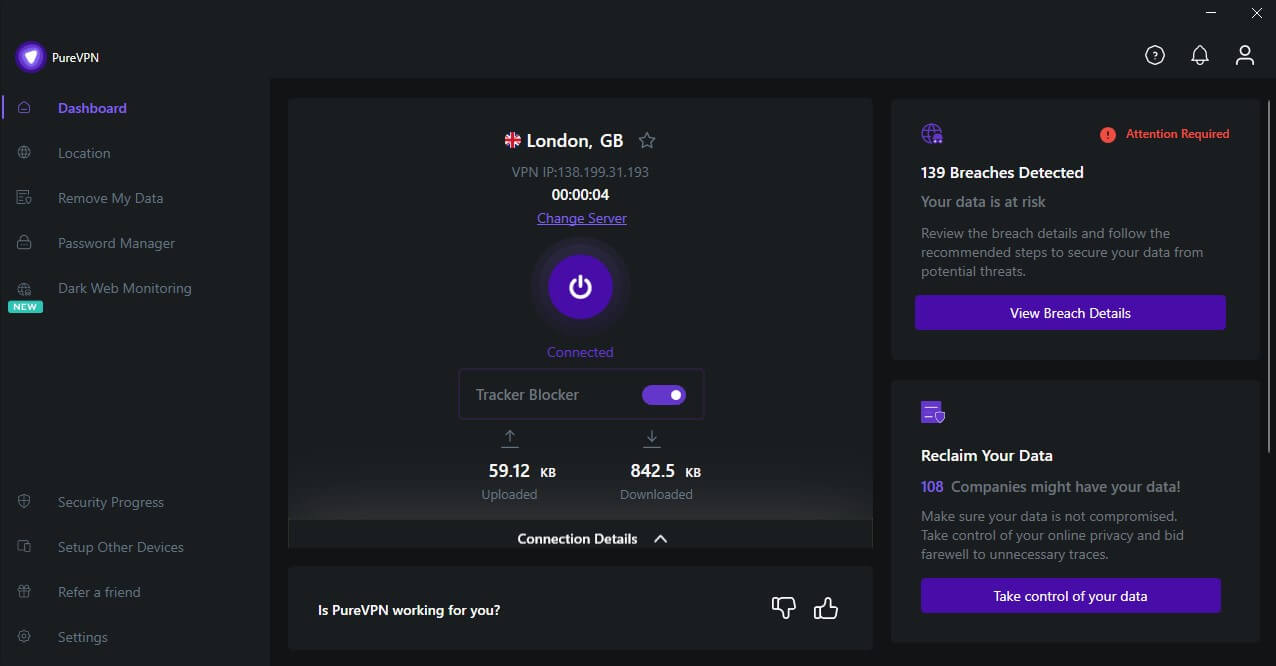

Device Support
Desktop (Windows, Mac, Linux): PureVPN offers feature-rich apps for all major desktop operating systems. The Windows and Mac versions are similar, providing full functionality and easy access to settings and features. The Linux app is particularly impressive, as it includes a full graphical user interface (GUI), unlike many VPNs that rely on command-line control. However, we believe there are better Linux VPNs available in 2024.
Mobile (Android, iOS): The Android app mirrors the desktop experience, with features like split tunneling and protocol selection intact. However, the iOS app lacks split tunneling, making it slightly less feature-rich. Despite these differences, both apps are straightforward, allowing for easy switching between servers and connection protocols.
Browser Extensions (Chrome, Firefox, Edge): PureVPN also provides browser extensions with 30+ server options, unlimited bandwidth, and WebRTC leak protection. Keep in mind that these extensions only encrypt browser traffic and not other device activities. They require an active PureVPN subscription.
Streaming Devices (FireStick, Apple TV, Android TV): PureVPN has native apps for streaming devices like FireStick, Apple TV, and Android TV, which are all easy to set up and offer robust security features. Notably, the FireStick app allows toggling protocols and using split tunneling, catering to different streaming needs.
Router Support & Simultaneous Connections
PureVPN’s compatibility extends to a variety of router types, from DD-WRT to Tomato, Asus, NetGear, and more. It allows you to encrypt all your network traffic at the router level, which is perfect for devices that don’t support VPN apps natively.
Plus, it supports 10 simultaneous device connections, far exceeding the industry standard, and with an add-on, you can connect even more devices.
Overall, PureVPN’s diverse compatibility and ease of installation across devices make it a reliable choice for users who want a seamless experience across their digital ecosystem.
PureVPN Add-On Features: Worth it?
As discussed throughout our review of PureVPN, the company offers various add-ons to enhance its base service, making it more suitable for various use cases.
Dedicated IP
PureVPN’s Dedicated IP is ideal if you need a consistent IP address, like accessing private servers or secure networks. This feature reduces the likelihood of IP bans and helps maintain uninterrupted access, especially for business use. At $2.49/month, it’s cost-effective compared to other VPNs but does add to your overall expense.
Port Forwarding
The port forwarding add-on is beneficial for gamers and torrent enthusiasts. It helps improve P2P connections and provides better access to gaming servers. This feature is offered at $1.49/month and is a worthy investment if you frequently engage in activities requiring stable connections.
PureKeep Password Manager
PureKeep enhances your digital security by offering encrypted password storage. It features cross-device sync and secure password generation, making password management seamless. As it’s relatively new in the market, it provides a decent and user-friendly option for those looking for an all-in-one privacy solution.
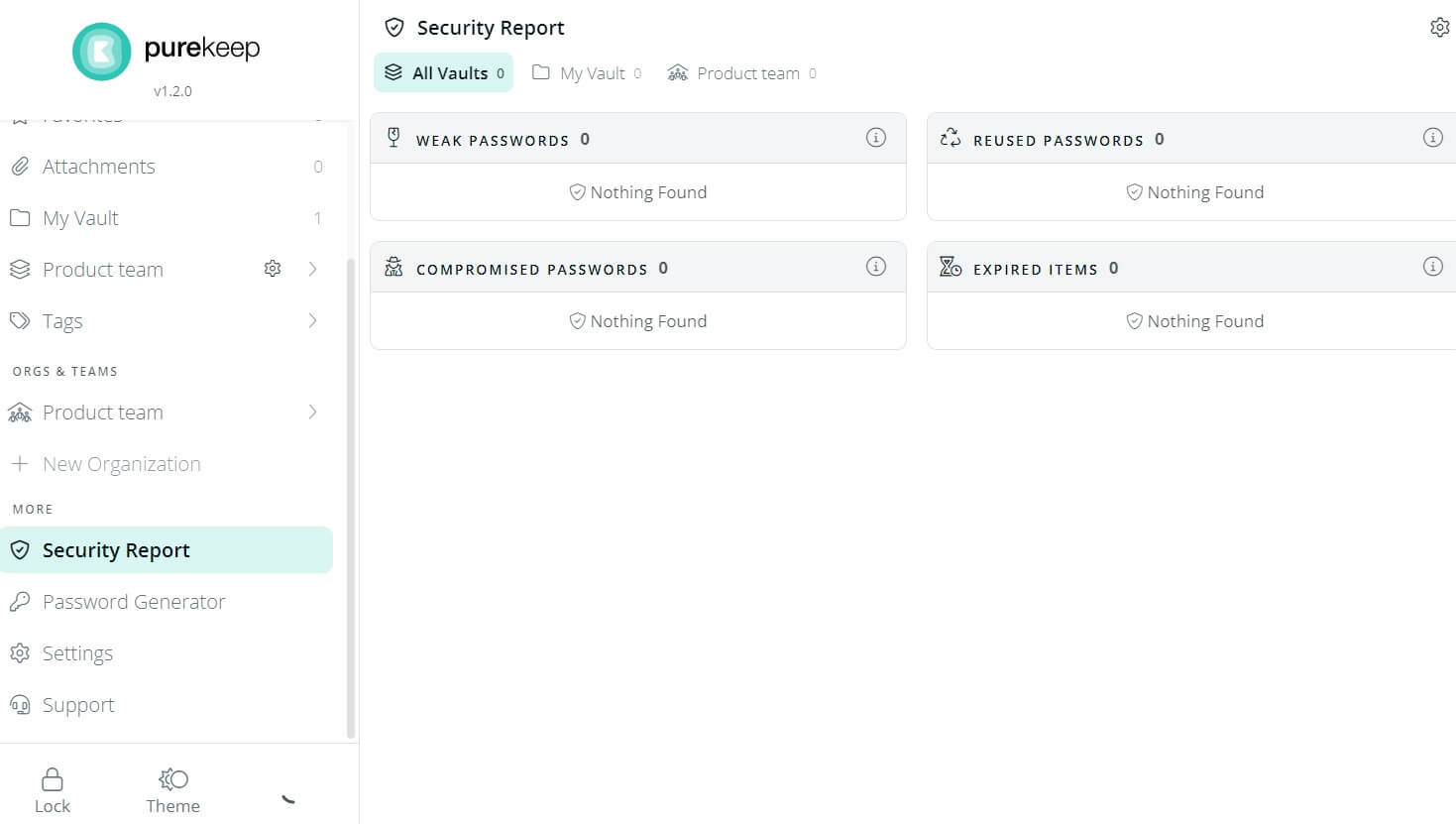

PureEncrypt
PureEncrypt brings secure file storage with end-to-end encryption, especially useful for sensitive data. The feature is still growing in its capabilities, with currently available support for Windows and Mac, making it useful for secure file transfers and storage without compromising on ease of access.
Should You Go for the Add-Ons?
These add-ons can be valuable, depending on your needs. While in our review, we found that PureVPN offers add-ons like a dedicated IP and port forwarding as separate features, other top-tier VPNs include many of these features as part of their standard packages.
For example, port forwarding is included in the VPNs of NordVPN and PIA, while ExpressVPN provides additional split tunneling and security features by default. This difference can make PureVPN’s add-ons seem less competitive if you’re looking for an all-inclusive VPN experience without extra costs.
Customer Support: Hit and Miss
PureVPN advertises 24/7 live chat support, which sounds promising.
However, the reality can be hit or miss. Sometimes, you’ll be greeted by a live agent fairly quickly, while other times, you may experience delays or have to go through a series of automated responses before getting real help. The quality of support varies, too—some users get their issues solved quickly, while others may find themselves stuck with incomplete solutions.
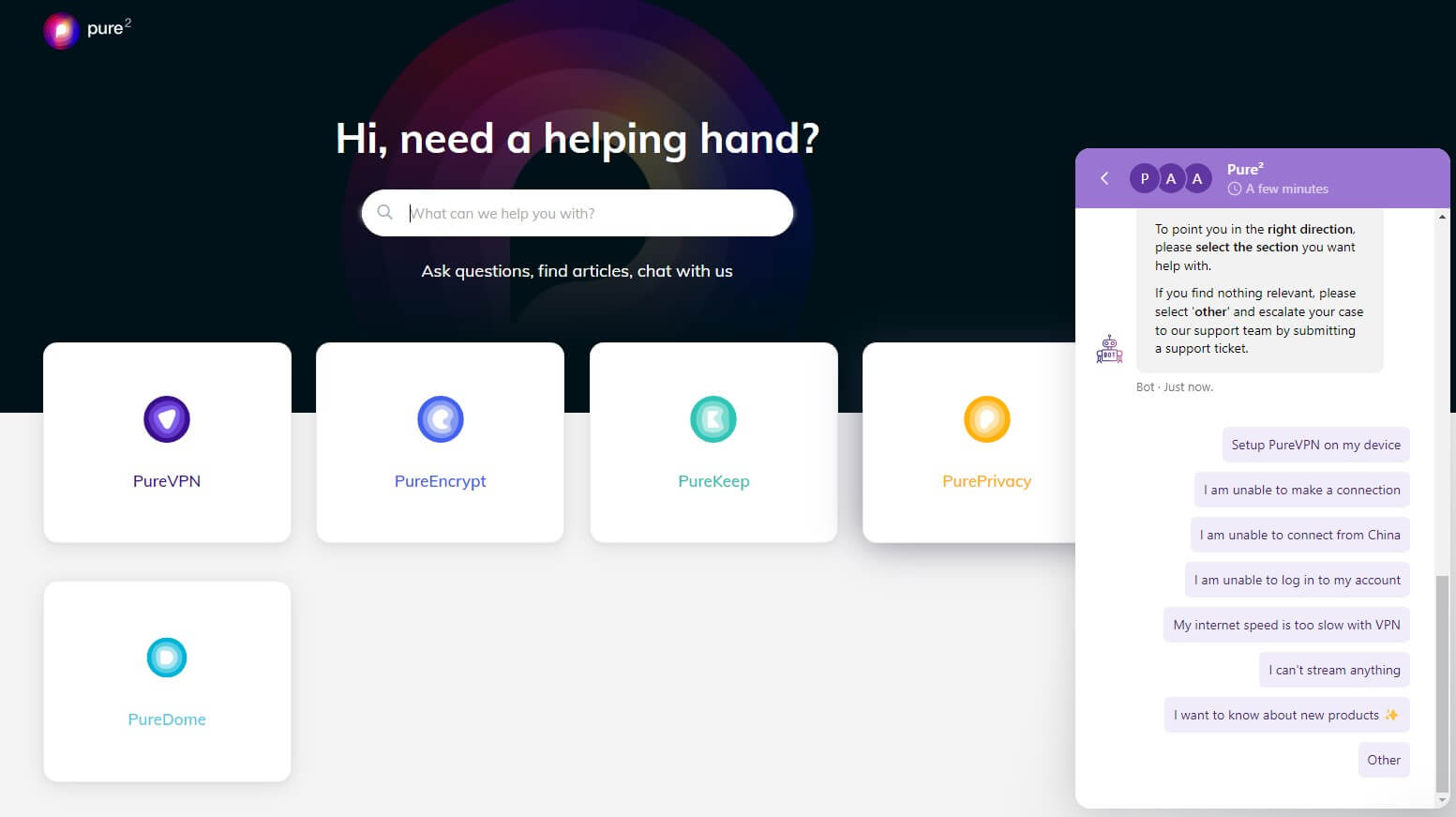

If you’re not in a rush, their email support offers a more reliable option. While it’s not the fastest method for urgent matters, it’s solid for detailed questions or troubleshooting that requires a bit more back and forth.
For those who like to take matters into their own hands, PureVPN’s website has a good library of FAQs, tutorials, and step-by-step guides. These are especially helpful for basic setups or common configurations, but they might not dive deep enough into more complex technical issues.
PureVPN’s live chat can be inconsistent, and support could be enhanced by increasing the availability of live agents and enriching existing guides with more advanced troubleshooting content. Overall, PureVPN’s support is good but still has noticeable gaps compared to the more polished and reliable customer support services of NordVPN and ExpressVPN.
Final Verdict
After our thorough analysis and hands-on testing, its clear from our PureVPN review that it offers plenty of features: an extensive server network, strong privacy commitments backed by no-logs policies, and standard security measures like AES-256 encryption and a kill switch. They’ve gone the extra mile with third-party audits, which is a good sign for privacy-conscious users. But let’s not sugarcoat things—it’s not without its flaws.
If your primary goal is to unblock streaming services or torrents, PureVPN delivers reasonably well, though the speed isn’t always consistent, especially when connecting to distant servers. That’s where things start to lag—literally. Speed dips are noticeable, and for a VPN that wants to compete with the big names, this can’t be overlooked.
While functional, customer support leaves room for improvement. Compared to the seamless, highly responsive support offered by top-tier providers, PureVPN’s service feels a bit sluggish. Also, those add-ons can really drive up the price, making it less budget-friendly than it initially appears.
For those seeking high performance and reliability, PureVPN may not meet your needs. You will likely be better equipped with NordVPN, ExpressVPN, or even Private Internet Access if you’re looking to improve your streaming, gaming, or overall internet experience.
But if you’re after an affordable option that gets the job done without too many bells and whistles, it’s still a viable choice—just don’t expect premium performance for a budget price.
Source link : http://www.bing.com/news/apiclick.aspx?ref=FexRss&aid=&tid=6720199b81cc41da984cacb465f218f9&url=https%3A%2F%2Fgizmodo.com%2Fbest-vpn%2Fpurevpn&c=9369365647545457527&mkt=en-us
Author :
Publish date : 2024-10-28 04:02:00
Copyright for syndicated content belongs to the linked Source.







